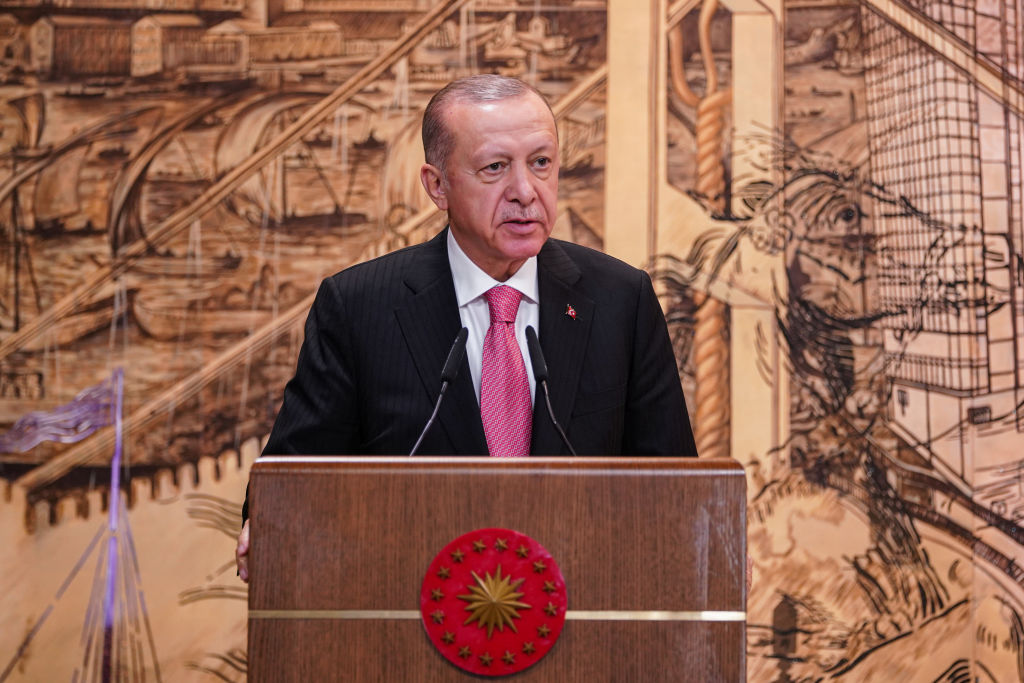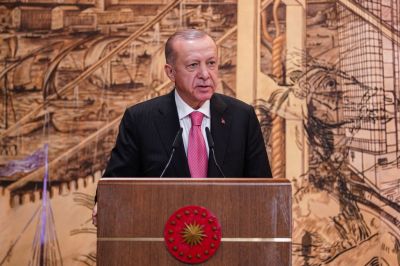When Russian troops stormed into Ukraine last February, the reverberations extended far beyond Ukraine’s borders. In my home country of Sweden, the previous self-evident truth that we should always remain neutral was shaken to the core. Sweden officially abandoned neutrality and applied to join NATO in May along with Finland, having been assured of a quick and easy application process. And then, everything went horribly wrong.
Turkey has issued a number of demands in return for a yes vote, and it’s holding up the process. Sweden is home to a Kurdish minority numbering 100,000, made up mostly of refugees who have fled Turkish persecution. Several Kurdish politicians hold prominent positions in the Swedish parliament. And Sweden has largely been friendly to the Kurdish cause in the Middle East, though its support has not been nearly as significant as Turkey alleges.
In fact, Sweden classified the Kurdistan Workers’ Party (PKK) as a terrorist group in 1984—the first country to do so after Turkey—and the PKK were considered prime suspects when then-Prime Minister Olof Palme was assassinated two years later (though no PKK member was ultimately charged). The Kurdish People’s Defense Units (YPG), vital in defeating ISIS, has not been classified as a terrorist group by Sweden nor for that matter the U.S., but Sweden has never aided the YPG nor the Kurdish Democratic Union (PYD).
What Sweden has done, however, is to grant asylum to a number of Turkish (mainly Kurdish) political dissidents. Other countries have been more hesitant to pick a fight with Turkish President Recep Tayyip Erdoğan by granting asylum to his critics. Sweden, which never anticipated joining NATO and hence needing Turkey’s approval, has taken a different approach. Turkey initially demanded that 73 individuals be deported to Turkey to face trial and all-but-certain imprisonment, but this list has now grown to 130 names after an anti- Erdoğan protest in Stockholm last week involving an effigy of Erdoğan, hanged upside down mimicking the way Italian dictator Benito Mussolini was executed. The Kurdish group behind the action said that they wanted to remind Erdoğan of the fate that often befalls dictators, and tell him to “Take this opportunity to resign, and you won’t end up upside-down in the Taksim square.” The Swedish government condemned the protest, but at the same time emphasized that nothing the protesters did was illegal.
Last summer, Sweden and Finland made serious concessions in exchange for a formal agreement that Turkey not veto their membership applications. The one sore point was the list of individuals to be deported. Sweden promised to re-examine these cases and try the individuals for any crimes Turkey could prove that they had committed. Turkey seems to have assumed that this was a mere formality and that “the ones who got away” would be returned. So far, though, only two individuals have been deported to Turkey, and several more have had their right to stay in Sweden affirmed by our Supreme Court.
Needless to say, Turkey is not pleased. In fact, an Erdoğan adviser said over the weekend that “We are not in a rush,” to vote on accession to NATO and said a vote was unlikely before Turkey’s election. Sweden’s new government is taking a more restrictive position on migration, so it’s understandable that Turkey may have thought the deportations were a done deal. But while Swedes by and large believe that the country has, in retrospect, been too generous with granting asylum claims, there are few who would agree to deport genuine political dissidents. And even national conservatives who have no problem with the idea of deportations nevertheless object to Turkey deciding who gets deported.
To be clear, none of the dissidents whom Turkey wants to see deported actually pose a threat to Turkey, but that was never the point. By successfully demanding that a neutral country famous for its humanitarian attitude toward refugees deport these dissidents, Erdoğan wanted to send a chilling message to all critics of the Turkish regime: Wherever you run, I can find you.
Erdoğan faces reelection in June, and the propaganda victory of securing the deportations would no doubt boost his standing. But allowing Sweden and Finland to join NATO with no further concessions could have the opposite effect.
From the U.S. point of view, it may seem that there is no rush. Unlike in May, when Sweden and Finland applied to join NATO, there is no immediate threat of Russia overrunning Ukraine and continuing straight into another country. The U.S. may wish to wait for the June elections, hoping Erdoğan will lose (which polling indicates is definitely possible), which would almost certainly resolve the problem. The first problem with this approach is that Erdoğan could win, either as a result of a disunited opposition, or due to election fraud. In this scenario, Erdoğan may well feel empowered to issue even more demands.
The second problem is that patience is running low in Sweden. The mood in the country is one of confusion and bitterness: Where are our allies? If we give up our neutrality, aren’t we supposed to have allies who can help us? Why is no one putting pressure on Erdoğan? Does the U.S. actually expect us to let Erdoğan pick and choose which Swedish residents he gets to have deported and thrown in a torture chamber? We knew that Turkey would frown upon our application, but we always counted on the U.S. and the other NATO countries to intercede.
More and more Swedes are beginning to wonder: Did we give up our neutrality for this?
Abandoning neutrality is a big deal for Sweden. It is as much a part of our national self-image as the image of being a superpower is to the U.S. Sweden last fought a war in 1814, leading to the occupation of Norway (which seceded in 1905). In 1834, Sweden formally declared neutrality in any upcoming military conflict, a policy that remained in effect until last year. Critics often point out that Sweden did in practice choose sides in certain conflicts (such as aiding Finland against the Soviet Union during World War II), but officially, Sweden was neutral.
Whatever resistance there may have been toward neutrality as a policy died after World War II. While other European countries lined up to form NATO, Sweden looked at our neighbors in northern Europe who had all been invaded over the course of the war and decided we had been the smart ones in staying neutral. This narrative was flawed from the beginning, as several neutral states (including Denmark and Norway) had been invaded anyhow. Sweden’s trade relationship with Nazi Germany saved us from being invaded by them, while the Soviet Union never got past Finland before suddenly having its hands full fighting off the Nazis.
For nearly the first half-century after the war, even joining the EU was considered too much of a foreign entanglement of a proudly neutral people like the Swedes. During the 1950s, Sweden built the fourth-strongest air force in the world, which was considered necessary if we were to be able to defend ourselves alone against a Soviet invasion. We know now that the military was always skeptical that we could weather such an invasion. Declassified documents reveal that the military believed that our air force would last all of one week against an all-out Soviet assault. The navy and coastal artillery would fare slightly better, but the real tough nut to crack would be our formidable infantry that would be able to stage a multi-year guerilla war that could bleed the Soviets dry.
It was well known among the military brass that intervention by the Western countries that formed NATO was our best and probably only chance of withstanding a Soviet invasion. The neutrality policy was actually phrased in a way that allowed for a loophole: Sweden would be neutral in peacetime, with the intention of being neutral in the event of war. Since the purpose of neutrality was to stay out of wars, if we were invaded despite being neutral, the policy must be considered to have failed, allowing our military to seek assistance and ally with other countries.
Outside of the military though, neutrality has always been sacrosanct. It didn’t just keep us safe, but also allowed us to play an outsize role in the world as a country that was trusted by almost everyone, which meant we could act as a mediator in global conflicts.
Abandoning this role says a lot about how the world has changed in the past year. With Ukraine receiving supplies and diplomatic support—but not troops— Sweden realized that NATO, at the end of the day, truly defends only NATO. Being on good terms with NATO countries, or having conducted exercises together with NATO militaries, is no substitute for an actual membership that guarantees Article 5 protections. NATO had repeatedly made that clear to Sweden, but the message did not stick until that fateful Thursday morning last February.
For Finland on the other hand, joining NATO is a huge step not so much because of a highly valued neutrality policy, but because this is the most defiant act Finland has committed against Russia since the Winter War. After that war, Finland became something of a doormat. The term “Finlandization” was coined to describe Finland’s (and later other countries’) foreign policy during the Cold War: Finland retained independence over its domestic policies and was not incorporated into the Soviet Union, but in exchange it lost control over its foreign policy, never criticizing the Soviet Union nor getting closer to the West. The Soviet Union was very clear: You don’t have to be communist, but if you get too cozy with the West, you’ll regret it. In effect, Finland became a buffer zone between the West and the East.
Now, Finland is finally once again taking a stand against Russia. And, like us, they are finding themselves in limbo, wondering where their new allies are. In both Sweden and Finland, pro-NATO parties are finding themselves flustered. But these domestic squabbles have wider implications. If Sweden and Finland end up in a permanent gridlock with Turkey that would prevent us from joining, or if our applications were withdrawn—which could happen if Erdoğan is re-elected and our governments see no way forward— Russia would gain a massive propaganda victory. It would seemingly demonstrate that NATO is a disorganized mess, inviting countries to join and then not approving them. Say what you will about Russia, but no country that has “applied” to join their sphere of influence has ever been turned down.
The weaker NATO appears, the more Russians will believe that victory in Ukraine is possible, and that, just like NATO let Sweden and Finland down, it just might also fail Ukraine. These are obviously different things—Sweden and Finland are not engaged in active combat—but from a psychological and propaganda viewpoint, slamming the door on Sweden and Finland would be huge for Putin’s regime. The applications were a huge and unexpected blow to Putin. It seemed for a long time that invading Ukraine would not create the desired “buffer zone” between Russia and the West, but rather just lead to even more neighbors joining NATO and further “encircling” Russia. That is ultimately what needs to happen.
What leverage does the U.S. have against Turkey? First, the U.S. could make a public statement to the effect that Sweden and Finland have fulfilled the terms of the agreement they signed with Turkey this summer. Second, Turkey’s economic situation is dire and the country is already receiving foreign aid from the U.S. The U.S. could make this aid conditional on Turkey not putting further obstacles in the way of the membership applications. Erdoğan can hardly afford for Turkey’s economic tailspin to accelerate further. If the U.S. offers additional aid in exchange for Turkey’s cooperation, that would likely be even more effective.
Swedish—and Finnish—membership in NATO would be beneficial for all involved. Both countries have made concessions to Turkey in return for its support. And failing to accept Sweden and Finland after all of this would give Vladimir Putin a huge boost. It’s time for the U.S. and other NATO members to tell Turkey to get out of the way.






Please note that we at The Dispatch hold ourselves, our work, and our commenters to a higher standard than other places on the internet. We welcome comments that foster genuine debate or discussion—including comments critical of us or our work—but responses that include ad hominem attacks on fellow Dispatch members or are intended to stoke fear and anger may be moderated.
With your membership, you only have the ability to comment on The Morning Dispatch articles. Consider upgrading to join the conversation everywhere.